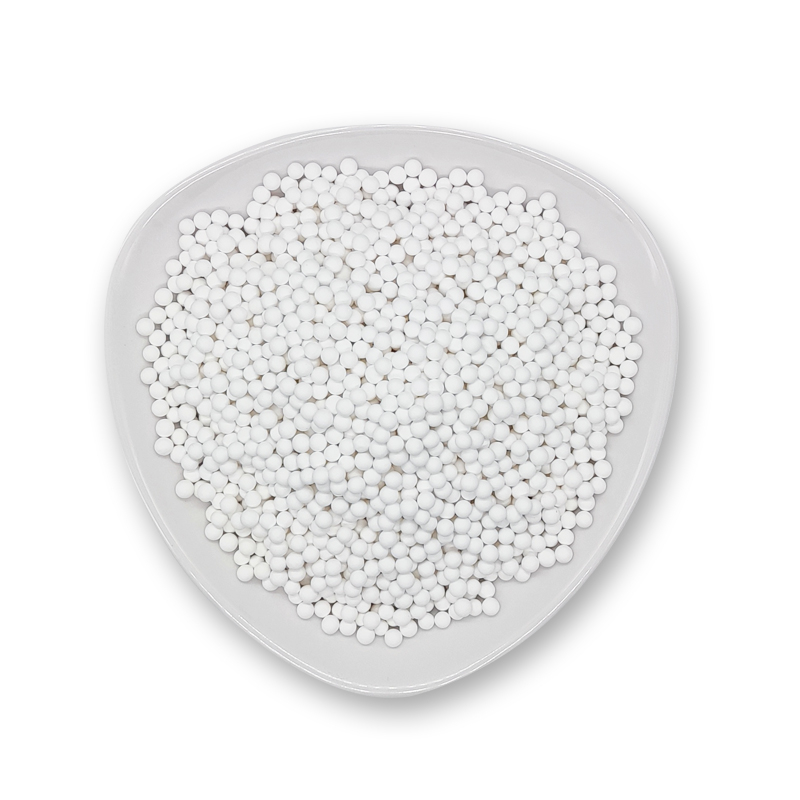Why you should choose our Dechlorination Ceramic Balls?--Excellent effectivity in eliminating residual chlorine in the faucet water--Demiss awful smell, smell taste, hazardous impurities, and micro-organic.--Food grade CaSO3, protected for consuming water treatment.--Professional Manufacture of bio-ceramic balls for 30 yearsWhat is Chlorine Removing Ceramic Balls:Dechlorination Ceramic Balls for Drinking Water Treatment, moreover regarded as calcium sulfite ceramic filter media, is regularly&nbs
Contact Now
Drip chlorine residual testing reagent into both tap water and water soaked with chlorine removal balls separately. If the water soaked with chlorine removal balls doesn't turn yellow, it indicates that the chlorine removal balls can eliminate residual chlorine in the waterDrip blue ink testing reagent into both tap water and water soaked with chlorine removal balls separately. If the water soaked with chlorine removal balls doesn't turn blue, it indicates that the chlorine removal balls can remove industrial pollutants from the water..
Contact Now
Test Data:CaSO3 Dissloved (mg/L)0.02Adding 5g CaSO3 Ball into400ml tap water (free chlorine 1ppm)%>=96%CaSO3 Percentage>=80%Adding 8g CaSO3 Ball into 400ml tap water (free chlorine 1ppm)%>=97%Bulk Porosity Rate>=39%Adding 10g CaSO3 Ball into 400ml tap water (free chlorine 1ppm) %>=98%Specific Area (cm2/g)>0.5*104Adding 15g CaSO3 Ball into 400ml tap water (free chlorine 1ppm) %100%Parameters:Size1mm-10mm, customizedCaSO3 Percentage>=95%AppearanceWhite Color Spherical BallsCaSO3 Dissolution0.02mg/LSpecific Area (m2/g)>5000Specific Density (g/m3)>1.3~1.55
Contact Now
Calcium sulfite is a food grade compound commonly used in water treatment as an effective method for chlorine removal. The principle behind calcium sulfite's ability to remove chlorine from water is based on a redox (reduction-oxidation) reaction.Here's a breakdown of the principle of calcium sulfite removing chlorine in water:Chlorine exists in water as a dissolved gas, typically in the form of hypochlorous acid (HOCl) or hypochlorite ions (OCl-).
Contact Now
Why We Need Calcium Sulfite Ceramic Balls?When food is washed in residual chlorine-containing water, several carcinogens, including chloroform, are created when the remaining chlorine reacts with organic acids.
Contact Now
ETERNAL WORLD Calcium Sulfite Dechlorination ceramic Ball Chlorine Remover for Shower/Water FilterProduction ManagementThe difference between our factory's independently developed fully automatic intelligent production line and other small workshopsAdvantages:1. Natural and Environmentally Friendly2. High Stability3. Easy to Use4. Cost-Effective5. Enhanced Water Treatment EffectivenessChlorine Removal TestAdd a residual chlorine test reagent to both tap water and water soaked with dechlorination balls.
Contact Now
Description: Chlorine Removal Ceramic Ball is composed of 95% Calcium Sulfite. It is broadly used in swimming pools, showers, bathtub clubs, chlorine elimination gear and etc. It has optimum overall performance in getting rid of chlorine, such as C10-, HC10, Cl2, and should get rid of 99% residual Chlorine in 0.8 seconds.Chlorine removal ceramic balls can be a convenient and effective way to improve the taste and odor of water by reducing chlorine content.Chlorine removal ceramic balls are a typ
Contact Now
Why you should choose our Dechlorination Ceramic Balls?--Excellent effectivity in eliminating residual chlorine in the faucet water--Demiss awful smell, smell taste, hazardous impurities, and micro-organic.--Food grade CaSO3, protected for consuming water treatment.--Professional Manufacture of bio-ceramic balls for 30 yearsWhat is Chlorine Removing Ceramic Balls:Dechlorinating Ceramic Media is a specialized filtration media designed to effectively remove chlorine from water.
Contact Now
Alkaline water refers to water that has a higher pH level than regular tap water. The pH scale measures the acidity or alkalinity of a substance, with a pH of 7 considered neutral. Alkaline water typically has a pH level between 8 and 9.Alkaline water contains minerals and antioxidants that can help combat free radicals and oxidative stress in the body. These properties are believed to have potential anti-aging and disease-prevention effects.
Contact Now
Why you should choose our Dechlorination Ceramic Balls?--Excellent effectivity in eliminating residual chlorine in the faucet water--Demiss awful smell, smell taste, hazardous impurities, and micro-organic.--Food grade CaSO3, protected for consuming water treatment.--Professional Manufacture of bio-ceramic balls for 30 yearsChlorine Neutralizing Ceramic Balls are an effective water treatment media designed to remove chlorine from water.
Contact Now
ETERNAL WORLD Food Grade Calcium Sulfite Dechlorination Ceramic Balls Chlorine Remover AquariumFunctions:Efficient Water Purification: Removes chlorides from water, enhancing purity.Antioxidant Properties: Heat-resistant and stable, ensuring long-lasting performance.Improved Taste: Eliminates chlorine and odors, providing a fresher water experience.Advantages:Eco-Friendly & Harmless: Made from natural ingredients, causing no negative impact on the environment or water quality.Long-Term Stability: Delivers consistent performance, reducing the need for frequent maintenance.Cost-Effective: Sa
Contact Now
The principle of alkalinity for removing iron involves the use of alkaline substances or materials to create an environment that facilitates the removal of iron from water. Here's a simplified explanation of how alkalinity aids in iron removal: pH Adjustment: Alkalinity is closely associated with pH, which measures the acidity or alkalinity of a substance. Iron is typically more soluble and easily dissolved in acidic conditions.
Contact Now
Functions:Adsorption Power: Zeolite Ceramic Balls are known for their high adsorption capacity, effectively capturing and removing impurities, heavy metals, and ammonia from water sources, resulting in cleaner and safer water.Filtration Efficiency: The porous structure of the ceramic balls enables efficient filtration, effectively trapping suspended particles, sediment, and turbidity in the water, providing crystal clear and visually appealing water quality.Ion Exchange Properties: Zeolite Ceramic Balls facilitate ion exchange processes, promoting the removal of harmful ions such as lead, cadm
Contact Now



































